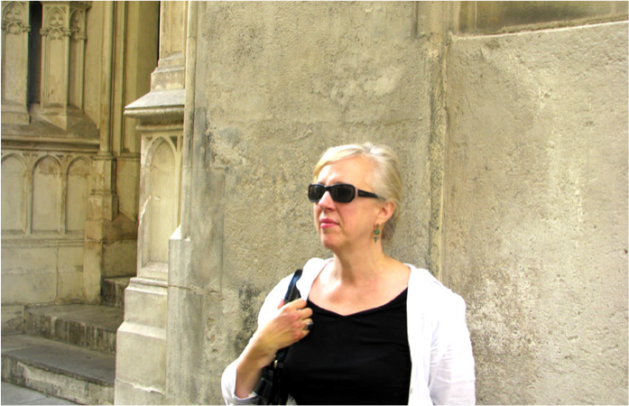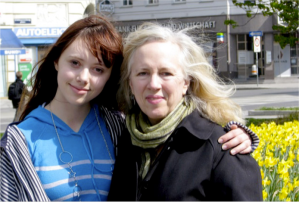Anne LeBaron’s latest gem out-sparkles the rest at final LA International New Music Festival concert
March 20, 2013 Leave a comment
In an ideal world, I would have been able to see all four concerts that formed the “LA International New Music Festival 2013″ presented by Southwest Chamber Music; alas, life often gets in the way. Thankfully, after multiple thwarted attempts to make my way out to The Colburn School for the festival, I was able to attend the final offering in the series.
Works by South American composers Carlos Chávez and Alberto Ginastera occupied the first half and two world premieres were offered up after intermission. It was all worthwhile, but by far, the most compelling music of the night was the new aria from Anne LeBaron, Some Things Should Not Move.
The work is intended to be just one part of a larger autobiographical monodrama for soprano and chamber ensemble, with the soloist playing three different roles (the Composer, the Daughter, and the Viennese Psychic). It stems from Dr. LeBaron’s 2008 sabbatical when she lived in Vienna; the flat she occupied had many abstract paintings hanging on its walls, and happened to be in a former monastery building. She describes in the program notes the rather unexpected stuff going on around her:
“After some weeks of living and working in this apartment, there were strange goings-on that became increasingly intense. Perhaps the strangest manifestations of unusual activity were subtle changes in the paintings themselves: colors would shift, shapes would alter. The work of art near the bed where I slept was the most active in these ways, and I had to remove it — not a good idea.” (Anne LeBaron, 2013)
Her daughter, Yvonne Eadon, provides the libretto. Now an undergrad at U.C. Berkeley, she was a high-school exchange student at the time in a nearby Austrian town, and she had some first-hand observations of the “goings-on” at her mother’s place — not to mention her mother’s reactions to them.
The resulting aria inspired by these strange events is rivetingly beautiful.
Dr. LeBaron, as she often does, asks much of her musicians: beyond some difficult passages using an array of both typical and atypical techniques, harp and bass also double as percussion instruments, and the harpist makes vocalizations. The soprano part is less avant-garde, but no less challenging. The combination creates music which is meticulously crafted, but feels thoroughly organic.
Just one example: the harpist plays an utterly gorgeous melody while a long strip of paper is woven through the strings, causing a slight buzz, all while the soprano sings of her dream above it; a seemingly trivial effect, but what first seems like a simple melancholy tune becomes more eerie and uncomfortable as it continues. Some Things Should Not Move is loaded with musically surreal moments like this.
Ms. Eadon’s excellent poetic text is certainly an important part in the work’s success. It is evocative without ever becoming cliché, though when the word “ectoplasm” pops up, it is a little distracting in its prominence.
Of course, none of it would work if the performance itself weren’t up to snuff. Fortunately, all of the musicians were absolutely first-rate. Despite having to work with a score, Elissa Johnston inhabited the solo role, giving a convincing portrayal of the troubled character while spinning one gorgeous vocal line after another. She never fails to impress in whatever repertoire she takes on. The instrumentalists offered sensitive support, with harpist Alison Bjorkedal making some particularly noteworthy contributions.
As a stand alone piece, Some Things Should Not Move works well, and I doubt I am alone in hoping it gets performed again. But let’s face it: this is merely a tease — a really good one, but still just a hint of what is possible. The whole monodrama needs to get composed and produced; let’s hope an astute donor steps up with a commission for Dr. LeBaron very soon so she can complete it.
The other world premiere of the evening, Positings by Roger Reynolds, was unfortunately overshadowed by Dr. LeBaron’s work that immediately preceded it. Performed by a chamber group augmented by a “computer musician,” it featured passages from the ensemble which were sampled and repeated by the computer musician; eventually, the samples were modified and expanded upon to create new sounds which were echoed by the traditional instruments. It began interestingly enough, but eventually lingered on too long and I grew tired of it before the end despite some interesting work from the computer musician.
The stand-out work from the South American composers was Serenata by Alberto Ginastera, a three-part collection of poetry and song for baritone and ensemble, with an aura that ranged from tribal to contemplative. Abdiel Gonzalez imbued his vocal solos with lyrical intensity.
Invención III by Carlos Chávez opened the concert. Intended as a 70th birthday present from the composer to Nadia Boulanger, the work has an abstract mystical sensibility. Alison Bjorkedal, Southwest’s always intrepid harpist, was the very capable soloist.
Southwest Chamber Music: March 2, 2013; Zipper Hall (The Colburn School)
LA International New Music Festival 2013, Concert #4
Chávez: Invención III
- Alison Bjorkedal, harp
Ginastera: Serenata
- Abdiel Gonzalez, baritone
- Peter Jacobson, cello; Larry Kaplan, flute; Lara Wickes, oboe; Helen Goode, clarinet; Rose Corrigan, bassoon; Andrew Pelletier, French horn; Ken McGrath and David Johnson, percussion; Alison Bjorkedal, harp; Tom Peters, double bass
- Jeff von der Schmidt, conductor
LeBaron: Some Things Should Not Move (World Premiere; text by Yvonne Mélisande Eadon)
- (Commissioned for the 25th anniversary of Southwest Chamber Music by The James Irvine Foundation)
- Elissa Johnston, soprano
- Larry Kaplan, flute; Alison Bjorkedal, harp; Tom Peters, double bass
Reynold: Positings (World Premiere)
- (Commissioned for the 25th anniversary of Southwest Chamber Music by The James Irvine Foundation and the Clarence E. Heller Charitable Foundation)
- Larry Kaplan, flute/piccolo; Andrew Pelletier, French horn; Lorenz Gamma, violin; Peter Jacobson, cello; Ming Tsu, piano; Paul Hembree, computer musician
—————
Photo credits: courtesy of http://www.annelebaron.com


Recent Comments